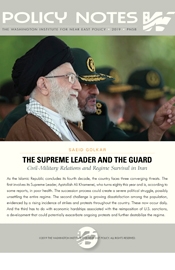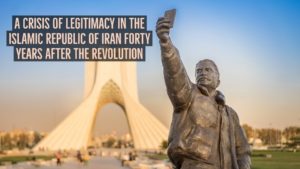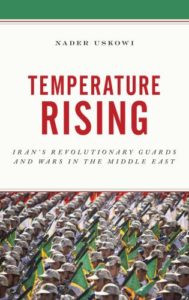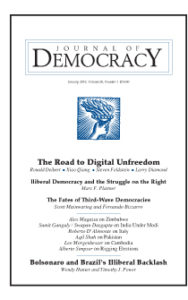 As the Islamic Republic concludes its fourth decade, the country faces three converging threats, according to Saeid Golkar, a visiting assistant professor in political science at the University of Tennessee at Chattanooga:
As the Islamic Republic concludes its fourth decade, the country faces three converging threats, according to Saeid Golkar, a visiting assistant professor in political science at the University of Tennessee at Chattanooga:
- The first involves its Supreme Leader, Ayatollah Ali Khamenei, who turns eighty this year and is, according to some reports, in poor health. The succession process could create a severe political struggle, possibly unsettling the entire regime.
- The second challenge is growing dissatisfaction among the population, evidenced by a rising incidence of strikes and protests throughout the country. These now occur daily.
- And the third has to do with economic hardships associated with the re-imposition of U.S. sanctions, a development that could potentially exacerbate ongoing protests and further destabilize the regime.
To neutralize these threats, the Islamic Republic and the Supreme Leader are increasingly relying on their security and coercive mechanisms, foremost the Islamic Revolutionary Guard Corps (IRGC) and its civilian militia force, known as the Basij, he writes in The Supreme Leader and the Guard:Civil-Military Relations and Regime Survival in Iran, a paper for the Washington Institute for Near East Policy:
Indeed, the most important factor in the survival and transition of political regimes is the loyalty of the armed forces. Dictators cannot stay in power if they lose support from their national military. As long as they enjoy military backing, a mass uprising cannot ultimately undermine their power, no matter how pervasive. Just as dictators rely on the armed forces to maintain power, the military can overthrow them and confiscate that power, as illustrated by the cases of Tunisia, Egypt, and Syria.
 “Intent on ensuring the regime outlasts his own tenure, the Supreme Leader and his hardline allies have implemented rigorous ideological training in the loyalist IRGC and other fighting groups,” he adds. “A vast network, led by so-called ideological-political organizations, promotes curricula to ensure that personnel live by Islamic Republic ideology, a strict religious code, and absolute obedience to the Supreme Leader.”
“Intent on ensuring the regime outlasts his own tenure, the Supreme Leader and his hardline allies have implemented rigorous ideological training in the loyalist IRGC and other fighting groups,” he adds. “A vast network, led by so-called ideological-political organizations, promotes curricula to ensure that personnel live by Islamic Republic ideology, a strict religious code, and absolute obedience to the Supreme Leader.”
For more than a year, since December 2017, protests and civil disobedience have been a fixture of life in Iran, analysts Nik Kowsar and Alireza Nader write for Foreign Policy (HT:FDD). Many of the political and economic grievances fueling this unrest will be familiar to foreign observers. But one major reason for these disturbances has gone overlooked: the country’s dire water shortages.
Having established its status and presence in Syria, it appears that Iran, which has a great deal of influence in Lebanon’s political system and daily life via Hizbullah, now seeks to further strengthen its direct control of the country by infiltrating its institutions and its vital areas, first and foremost the military and also energy and health, argues N Mozes. This is aimed at, among other things, opening up the Lebanese market for Iranian goods, which have a very limited market because of the U.S. sanctions on Iran, he writes for the Middle East Media Research Institute (HT: FDD).
 What about Iran today? asks Golkar, a former postdoctoral fellow at Stanford University’s Center on Democracy, Development, and the Rule of Law. With rising mass discontent and protests around the country, will the IRGC stick with Ayatollah Khamenei until the end as the military did for President Bashar al-Assad in Syria, or will it stage a coup against him, as in Egypt, or stop supporting the regime, as in Tunisia? What about the post-Khamenei era? In what ways will the IRGC evolve or reshape then? RTWT
What about Iran today? asks Golkar, a former postdoctoral fellow at Stanford University’s Center on Democracy, Development, and the Rule of Law. With rising mass discontent and protests around the country, will the IRGC stick with Ayatollah Khamenei until the end as the military did for President Bashar al-Assad in Syria, or will it stage a coup against him, as in Egypt, or stop supporting the regime, as in Tunisia? What about the post-Khamenei era? In what ways will the IRGC evolve or reshape then? RTWT
At a forthcoming presentation at the National Endowment for Democracy, Reagan-Fascell fellow Dr. Ladan Boroumand will reflect on crucial phases that have defined Iran’s state-society dialectic, and bring to light the unprecedented cultural and ideological consequences of this dynamic. Using state violence as an indicator, she will examine the diverse ideological and religious challenges faced by the Islamic regime of Iran.
featuring
Dr. Ladan Boroumand, Reagan-Fascell Democracy Fellow, Co-Founder, Abdorrahman Boroumand Center for the Promotion of Human Rights and Democracy in Iran
moderated by
 Mr. Marc Plattner
Mr. Marc Plattner
Founding Co-Editor, Journal of Democracy, Co-Chair, International Forum for Democratic Studies’ Research Council
Tuesday, February 26, 2019
3:00 p.m.–4:30 p.m.
1025 F Street, N.W., Suite 800, Washington, D.C. 20004
Telephone: 202-378-9675 RSVP







